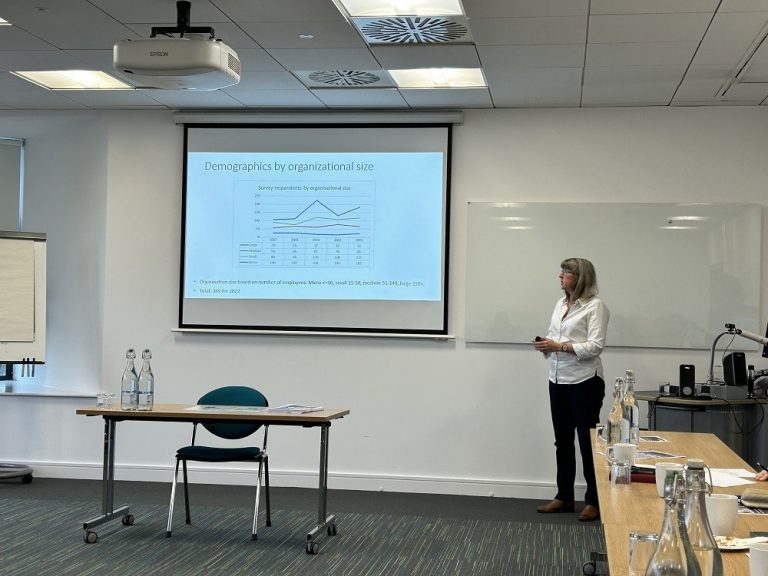
Chesterfield businesses have been urged to take action if they want to make a difference to the town’s future.
Speaking at the annual Celebrate Chesterfield Conference on Thursday 2 March, organised by Destination Chesterfield in association with Addooco IT, Peter Swallow, chair of the town’s inward investment marketing campaign Destination Chesterfield, called on businesses to ‘get involved,’ ‘collaborate’ and ‘make change happen’ to ensure the town achieves its transformational growth strategy by 2030.
He said: “We have a network of more than 200 businesses, charities and education providers in Chesterfield, known as Chesterfield Champions, and the people in these organisations do so much to support Destination Chesterfield to market the town as a destination to invest, work, live and visit.
“But if we want to see the town thrive in an increasingly competitive market, we need to do even more collectively. We must collaborate and buy from each other and we must champion Chesterfield outside the area in order to help us bring investment into the borough and create highly skilled jobs.”
Launched on 23 February by Chesterfield Borough Council, key headline targets of the Chesterfield Growth Strategy include:
· Increasing the number of employee jobs in the borough by 4% (2,000 jobs).
· Increasing the number of businesses by 12% (400 businesses).
· Increasing the number of higher value businesses by 15% (100 businesses).
· Increasing the share of Chesterfield residents in knowledge-based occupations by 15% (baseline Census 21 – 18,000).
· Increasing the value of the visitor economy by 20% (baseline £163m).
Speaking about the ambitious strategy at the conference, Councillor Tricia Gilby, leader of Chesterfield Borough Council, said: “Bringing together the public, private and community sectors to champion our borough is key to achieving our ambitions and strengthening the local economy. As a council we have continued to bring investment into the area from central government and elsewhere.
“Earlier this year we announced our success in bringing almost £2.7 million of UK Shared Prosperity Funding into the borough, a comprehensive spending plan is in place that will provide training support, grant programmes for businesses and charities, as well as helping to make further improvements to green spaces, sports and play facilities across our borough.
“We have secured more than £45 million from the government, this will be used to invest in the future of Staveley but also to improve Chesterfield town centre and enhance our appeal to visitors.
“Looking to the future there is more than £2 billion of investment across our borough and this will help ensure that we have a bright future ahead of us but there is still more we can do and working with the Chesterfield Champions we look forward to promoting our borough as the place to live, work, visit and invest.”
As well as being chair of Destination Chesterfield, Mr Swallow is also Managing Director of Bolsterstone Group Plc. The company developed the new flagship office space One Waterside Place which opened earlier this year.
Chesterfield Borough Council’s Growth Strategy will see further investors like Bolsterstone Group and Devonshire Group attracted to the borough.
The Devonshire Group is behind the future residential development and regeneration of 150 hectares of former industrial land in Staveley and is also partnering with Chesterfield Borough Council, Chesterfield College and the University of Derby in delivering the Construction Skills Hub. This is funded through the Staveley Town Deal and will provide training, careers insights, and work experience for more than 5,000 learners on a live construction site over 10 years.
In addition to site and bench joinery, brickwork, ground works and electrical installation the Hub will also provide training in green technologies.
Andy Byrne, property development director for The Devonshire Group, also spoke at the conference, saying: “Although we have land in the area, the Devonshire Group is investing in Chesterfield because we have opportunities with great partners – Chesterfield Borough Council, Derbyshire County Council, Harworth Group and HBD. The geography of Chesterfield is one of its many advantages. It has good motorway and rail links and also a skilled workforce already present in the area.”
The annual Celebrate Chesterfield conference, which was attended by more than 250 members of the town’s businesses community, also saw the launch of the new Destination Chesterfield plan, which will position the borough as a desirable and contemporary destination for visitors, investors and residents.
The new plan places the town’s network of Champions at the forefront, having been recently praised by the UK’s leading place branding, place marketing and place making specialist Thinking Place, as a ‘sales force’ for the town.
Celebrate Chesterfield was sponsored by Chesterfield Champions Addooco IT, University of Derby, Choice Utility and Markham Vale.
Peter Swallow added: “The financial support of the town’s Champions is incredibly important to ensure events such as Celebrate happen. For people to be onboard and contributing actively to the town’s growth and development, then they also must be informed and involved with plans. The lasting and far reaching change we are striving for in Chesterfield cannot be done by one organisation alone; it must be a collaborative effort.”
Nigel Mallender, head of sales and marketing at Addooco IT Ltd, the event’s headline sponsor, said: “Addooco are a proud Chesterfield based business and the majority of our Team live in the town. We’re delighted to support the many Destination Chesterfield events and to promote their initiatives wherever possible.
“They do an excellent job of increasing awareness of our town and in spreading the word on what a great place Chesterfield is to live, work, meet and to run a business. Addooco are committed to Chesterfield and continue to use local suppliers, services and hire local people wherever we can.”
Dan Molloy, Managing Director of Choice Utility, added: “I believe that Chesterfield is one of the best places to do business out of. It’s important that the businesses based here support the town and each other, whether it’s through attending and sponsoring events like Celebrate Chesterfield or shopping local. Having a thriving local economy is key to developing conversations with national investors and ensuring Chesterfield continues to grow and develop.”
Adam Doyle, head of business engagement and employability at the University of Derby, which is supporting the Festival of Business Exhibition, said: “We were proud to be the partner of the Derbyshire Festival of Business exhibition at Celebrate Chesterfield.
“The festival plays a key role in continuing to support the business community to innovate and grow, aligned to our aim of raising skills and aspirations across our region. Working with businesses, we are helping to position our county internationally as a place to do business as well as a place to study, live and work.”
A spokesperson for HBD, the developer behind Chesterfield’s successful Markham Vale and a sponsor of Celebrate Chesterfield, added: “Chesterfield is a fantastic place to do business, as demonstrated by the phenomenal growth we’ve seen at Markham Vale and the creation of more than 2,700 new jobs.”











